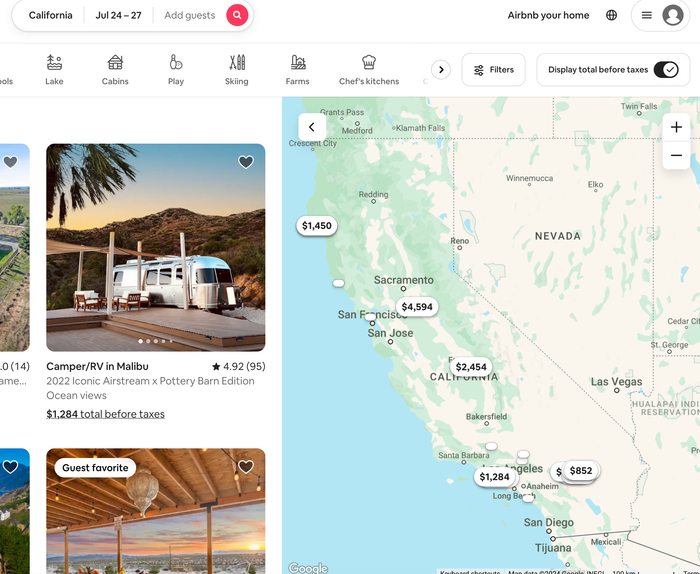California mandates hotels to reveal hidden fees during booking

Editor's note: This article has been updated to add a new quote. It was initially published on June 21, 2024.
Starting July 1, all California hotels are required to disclose unexpected junk fees due to two new state laws, including one that specifically addresses resort and cleaning fees.
The California State Legislature has recently enacted Senate Bill 478, amending the California Consumer Legal Remedies Act. This legislation compels issuers to clearly communicate all extra fees beyond the basic service at the time of booking. Commonly referred to as "surprise fees," charges from hotels, cruises, and airlines often remain hidden until checkout, only appearing in the final bill alongside other taxes and fees.
Several major hotel chains, such as Marriott, Hilton, Hyatt, and Choice Hotels, have begun to transparently disclose resort destination fees when booking, largely due to consumer lawsuits and pressure from the White House.
"Consumers value transparency, and we have enhanced Hilton's websites and apps to ensure that mandatory fees are clearly displayed at the outset. With numerous options for lodging available, we also push for transparent, fee-inclusive pricing across all booking platforms that feature our listings," a Hilton representative stated via email. "This is why we endorsed legislation aimed at creating a standard for mandatory fee displays throughout the industry—from hotels to online travel agencies and short-term rental platforms—ensuring that all parties selling lodging reveal mandatory fees in the upfront prices they display."
In 2021, for instance, Marriott reached a settlement with the Pennsylvania attorney general and committed to displaying resort fees in future bookings, prompting other major U.S. hotel chains to adopt similar practices.
"[Senate Bill 478] would ... make it illegal to advertise, display, or offer a price for a good or service that excludes all mandatory fees or charges, except for government-imposed taxes or fees," according to the bill.
The legislation would also ban hidden fees, including those added to hotel stays, food delivery charges, and event tickets. It would similarly compel cruise lines to be more forthcoming about hidden costs from the very start of the booking process, rather than revealing them later.
"Today, California is putting an end to hidden fees. These misleading charges make it difficult for consumers to know their total costs upfront," stated California Attorney General Rob Bonta in a statement on Oct. 7, 2023. "As more websites, apps, and physical businesses employ these tactics, they disadvantage those companies that are transparent and honest about their pricing. The price Californians see will be the price they actually pay."
Last year, Governor Gavin Newsom enacted Assembly Bill 537, targeting hidden resort cleaning and service fees, set to take effect on July 1. This legislation mandates that hotels disclose any resort fees, along with other additional costs, at the same time as the room rates.
Senator Steve Glazer, a Democrat from Contra Costa County and one of the bill's co-authors, previously proposed a similar initiative (Senate Bill 683) that aimed to require all lodging services—hotels, short-term rentals, and third-party booking sites—to present the total cost of the stay, inclusive of any additional fees. However, the bill did not progress.
This new legislation also extends to Airbnb bookings, where users are currently required to toggle a switch to view nightly rates that encompass all fees. In California, this requirement is expected to be eliminated.
 AIRBNB.COM
AIRBNB.COM"Our total price display aligns with the concerns addressed in California's new fee transparency laws," stated an Airbnb representative. "Guests in California will see our total price display on every listing."
Hyatt representatives did not provide comments by the time of publication; however, industry analysts do not anticipate that this new legislation will lead to higher hotel prices.
"This new regulation is expected to simplify the process for consumers when comparing the actual total cost of their stay—including the base rate, taxes, and mandatory fees—across different hotels," remarked Henry Harteveldt, Founder of Atmosphere Research, a travel industry analysis firm. "This will be particularly beneficial on price comparison websites and apps, where a hotel with a low base rate but high resort or destination fees might currently rank higher in search results."
At a national level, the Biden administration has focused on eradicating junk fees, including those associated with hotels, resorts, and airlines, and is actively pursuing their removal through national legislation. In April, the U.S. Department of Transportation finalized a rule that mandates airlines disclose the complete flight cost upfront, including baggage and seat assignment fees. Airlines are required to comply by late April 2025, although many carriers are challenging this "arbitrary" regulation in court.

1

2

3

4

5
Evaluation :
5/5